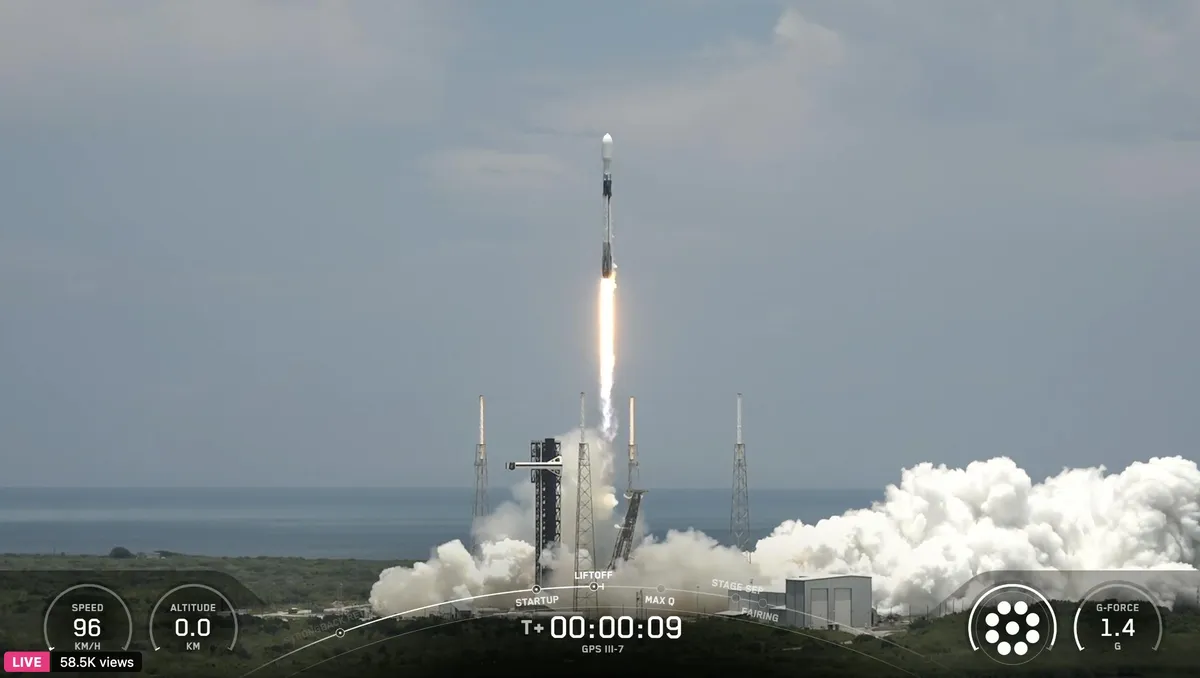
On May 30, SpaceX successfully launched its Falcon 9 rocket, deploying the latest addition to the U.S. military's Global Positioning System (GPS) constellation. The rocket lifted off from Cape Canaveral Space Force Station at precisely 1:37 p.m. Eastern Time, carrying the GPS III SV-08 satellite. This mission marks the eighth installment in the U.S. Space Force's third-generation GPS constellation, which aims to enhance global navigation capabilities.
The Falcon 9 rocket demonstrated its reliability by successfully returning to Earth after the launch. It landed on a droneship stationed in the Atlantic Ocean, showcasing SpaceX's advanced recovery technology. Approximately 90 minutes post-liftoff, SpaceX confirmed that the GPS III SV-08 satellite was deployed into its designated orbit, marking another milestone for the company.
Developed by Lockheed Martin, the GPS III SV-08 satellite is part of a contract awarded to the Pentagon in 2008, which includes a total of 10 GPS III spacecraft. Compared to earlier GPS models, the GPS III satellites boast nearly eight times better anti-jamming resistance, improved accuracy, and heightened reliability, as stated by the Space Force. These satellites also transmit the encrypted M-code signal for military applications and the L5 signal, which is intended for civilian safety-of-life use in aviation and other transport sectors.
The GPS satellites operate in a medium Earth orbit, approximately 12,550 miles above Earth. This altitude is optimized for providing comprehensive global coverage and consistent timing signals. “Every launch makes the GPS constellation more accurate and resilient,” said Col. Andrew Menschner, the commander of Mission Delta 31, in a statement following the launch. Mission Delta 31 is responsible for operating the GPS constellation from Colorado Springs, Colorado.
Col. Menschner highlighted that the constellation currently consists of 31 active satellites, with seven in reserve status and two completed GPS III vehicles awaiting launch. “The constellation is healthy and ready to support the six billion people around the world who utilize our capabilities every day,” he added.
The GPS III SV-08 satellite is now under the control of Lockheed Martin's launch and checkout operations center in Denver, where it will remain until officially accepted into the operational GPS network. Initially assigned to the United Launch Alliance (ULA), the SV-08 satellite was transitioned to SpaceX to expedite its deployment. ULA's next-generation Vulcan Centaur rocket, which has recently been certified for national security missions, is not expected to commence operations with similar payloads until later this summer.
This transition emphasizes the evolving landscape of the U.S. launch sector, where SpaceX has established itself as a dominant player in both commercial and national security space missions. The recent flight marked the fifth national security launch for SpaceX this year, with an additional dozen missions scheduled through December, further solidifying its position in the aerospace industry.